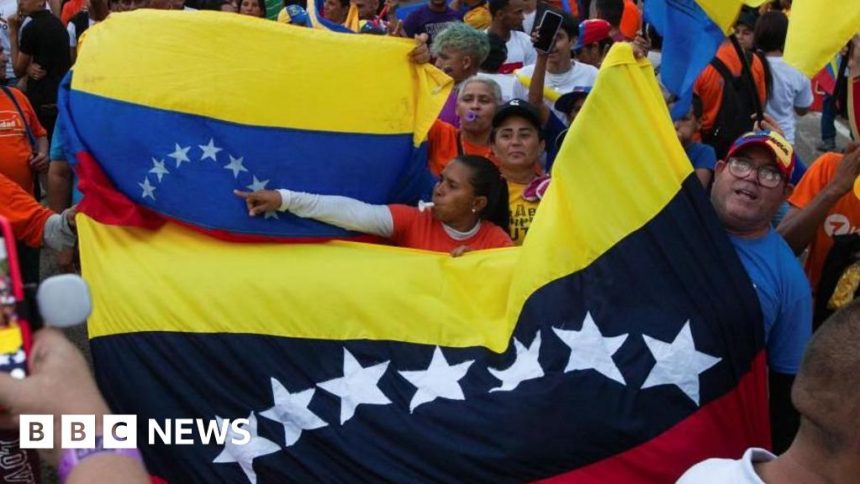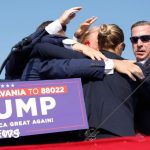Venezuela election: Five things you need to know
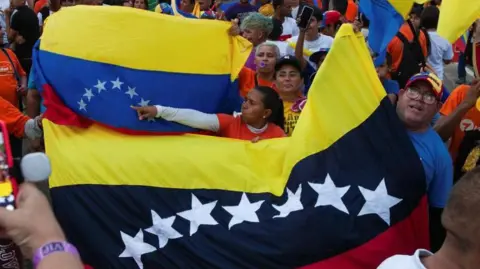 Reuters
ReutersVenezuelans will be going to the polls on Sunday in the most tensely awaited presidential election in more than a decade.
Opposition supporters think that they stand a real chance of ousting the incumbent, President Nicolás Maduro, from office after 11 years.
Meanwhile, Mr Maduro, who is running for a third consecutive term, has painted the election in stark terms, warning that a defeat for his socialist PSUV party could trigger “a bloodbath”.
Here, we look at five things you need to know about the polls and how we got here.
It’s a chance for change after a quarter-century
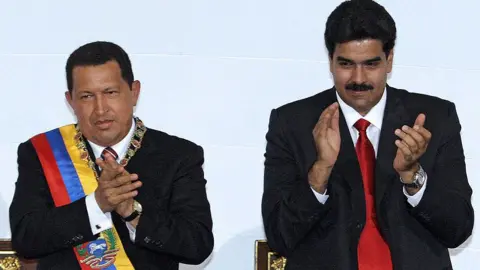 Getty
GettyThis election could bring a change of government to Venezuela after 25 years in which it has been run by the socialist PSUV party – first under the leadership of the late President Hugo Chávez, and after his death from cancer in 2013, under his protegee, Nicolás Maduro.
During this quarter of a century, the PSUV has come to dominate key institutions in the country.
A PSUV-led coalition holds 256 out of 277 seats in the National Assembly, Venezuela’s legislative body.
This almost total control of the legislature has in turn allowed the Maduro government to take control of two other key institutions whose members are chosen by the National Assembly:
- Supreme Tribunal of Justice – Venezuela’s highest court
- National Electoral Council (CNE) – the body responsible for organising elections
With the government in control of the executive, the legislative and, to a large extent, the judiciary, democracy has been undermined.
A divided opposition has in the past failed to pose a serious challenge to the Maduro Administration.
Its strategy of boycotting elections because they were not free and fair resulted in Mr Maduro being re-elected in 2018 in an election widely dismissed as a sham, and in the National Assembly being almost completely in his party’s hands.
But the main opposition parties, which have now united behind one candidate, have dropped their election boycott, arguing that even though they have been hampered and harassed by the government along the way, this presidential election constitutes their best chance to oust Mr Maduro from power.
They point to opinion polls which suggest their candidate, Edmundo González, has an overwhelming lead over Mr Maduro and argue that support for Mr González is so overwhelming that it will thwart any potential attempts by the government to steal the election.
Mr González has said that if he wins, he will restore the independence of Venezuela’s institutions.
Another win for Mr Maduro is expected to allow him to further tighten his grip on power and to curtail the activities of the opposition even more.
It matters well beyond Venezuela’s borders
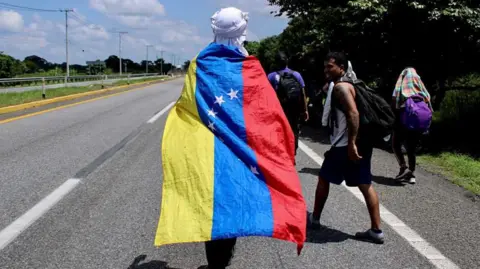 Reuters
ReutersThe result of the election will have repercussions well beyond the South American country of 29.4 million inhabitants.
Over the past 10 years, 7.8 million Venezuelans have fled the country because of the economic and political crisis into which the country was plunged under the Maduro Administration.
Polls conducted in the run-up to the election suggest that exodus is only going to increase if President Maduro wins another term.
One poll put the number of those saying they would leave if Mr Maduro is re-elected at 10% of the current population. Another even suggested a third of the population could emigrate.
Either way, the number of those planning to leave the country in case of a Maduro win is expected to increase.
While the majority of Venezuelans have migrated to other Latin American countries, a sizeable number have chosen the United States as their destination.
With immigration a hot topic in the US election, who emerges victorious in Venezuela will therefore be closely watched in Washington, as well as in Latin American countries to which Venezuelans have emigrated en masse.
Good-bye Cuba, Russia, China and Iran – hello US?
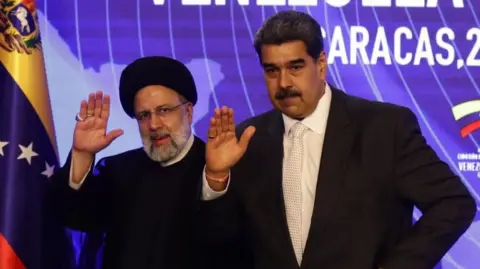 EPA
EPARelations between Mr Maduro and his US counterparts have been rocky.
The Venezuelan leader blames US sanctions for his country’s economic woes and has forged close alliances with China, Iran, and Russia – nations which also have a thorny relationship with the US.
A change of government could see Venezuela turn away from these countries as well as from its close ally, Cuba.
Who Venezuela does business with matters because the Andean country has the world’s biggest oil reserve.
Its oil output has plummeted under President Maduro – the result of a combination of lack of investment, mismanagement and oil sanctions.
A lifting of the oil sanctions – imposed by the US in order to exert pressure on Mr Maduro following the 2018 presidential election which was widely dismissed as neither free nor fair – could have repercussions on the price of oil globally.
The most popular opposition politician is not on the ballot
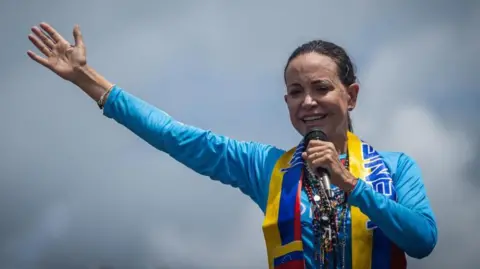 EPA
EPAWhile opposition supporters have united behind Edmundo González, the person who inspired hope in the opposition ranks that Mr Maduro can be defeated is María Corina Machado.
Ms Machado won an opposition primary held in October 2023 with 93% of the roughly 2.3 million votes cast.
What made the result even more extraordinary was that she was barred from running for public office at the time.
She appealed against the ban, but it was upheld by the Supreme Court, which is dominated by government loyalists.
Her handpicked stand-in, Corina Yoris, was prevented from registering as a candidate and it was only then that Mr González was chosen as a “provisional” candidate.
However, the soft-spoken and low-key former diplomat managed to gain the trust of the opposition parties in the following weeks and Mr González was picked as their unity candidate.
Ms Machado has thrown her weight behind him and criss-crossed the country campaigning for Mr González and the two have formed a powerful alliance.
No level playing field and fear of fraud
The ban imposed on Ms Machado by the then comptroller general, Elvis Amoroso, is just one of the many difficulties the opposition has faced.
Since the beginning of the year, more than 100 of its campaign activists have been jailed.
Ms Machado has been stopped at roadblocks, her car was vandalised and damaged, and restaurants that had served her were closed down.
Many observers fear that Maduro and his allies will do everything in their power to stay in the presidential palace.
There have been reports of many anomalies and changes which benefit the governing party, including the fact that the majority of the 7.8 million Venezuelans living abroad were not able to register.
With the National Electoral Council (CNE) – the body which organises elections and announces their results – dominated by government allies and led by Elvis Amoroso, the same man who banned Ms Machado from running for office, many fear that Maduro allies could resort to fraud.
This fear has been further stoked by the fact that Mr Amoroso revoked the invitation to European Union election observers to monitor the polls.
The ex-President of Argentina, Alberto Fernández, was also uninvited after he said that the Maduro government should accept a possible defeat at the polls and Brazil suspended its observer mission after being criticised by President Maduro.
Now, only four observers from the United Nations and a handful of technical observers from the Carter Center will be present at the election.
The Carter Center has already warned that “given its limited size and scope, the Center’s mission will not conduct a comprehensive assessment of the voting, counting, and tabulation processes”.
Voting in Venezuela is electronic. Voters punch in a button assigned to their preferred candidate on a voting machine.
The machine prints out a paper receipt which is then placed in a ballot box.
The electronic results are sent to the CNE headquarters and should be made public shortly after the polling booths close.
The opposition is planning to deploy thousands of witnesses to monitor the count of the paper receipts at individual polling stations and plans to keep its own tally to get a sense of the number of votes it has won.
While the opposition has so far struck an optimistic note, pointing to the large number of people who have flocked to their campaign rallies, there is no doubt that the hours after the polling stations close and before the result is announced will be some of the tensest in the past decade.



